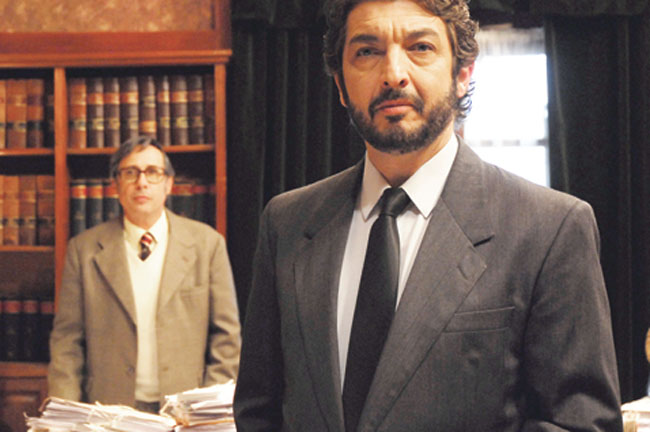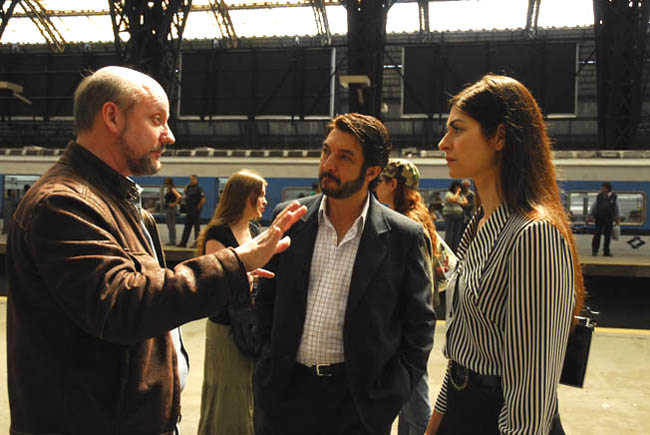CHICAGO – Patrick McDonald of HollywoodChicago.com appears on “The Morning Mess” with Dan Baker on WBGR-FM (Monroe, Wisconsin) on March 21st, 2024, reviewing the new streaming series “Manhunt” – based on the bestseller by James L. Swanson – currently streaming on Apple TV+.
Interview: Oscar-Winning ‘The Secret in Their Eyes’ Director Juan José Campanella
CHICAGO – And the Oscar for Best Foreign Language Film goes to…”The Secret in Their Eyes,” Argentinian director Juan José Campanella’s complex, compelling and political treatise on facing the demons and ghosts of the past.
Set in Argentina, The Secret in Their Eyes stars Ricardo Darin as Benjamin, a retired public attorney whose last request from the office involves a file regarding an unsolved case from the 1970s. Told in flashback, it was Benjamin who was responsible for the prosecution in the murder of a innocent newlywed bride. A new minted attorney in his office at the time, Irene (Soledad Villamil), works on the investigation as well, and her relationship with Benjamin plays out both in the past and present. As the mystery begins to provide answers, the truth could cleanse the sins of the past.
Juan José Campanella, after a emigrating to New York City from Argentina, has spent most of his career directing American television, most notably Hugh Laurie in “House” and 17 episodes from 2000 to 2010 of “Law & Order, SVU”. He returns to his native roots for feature films, and was also nominated previously for the Best Foreign Language Film Oscar in 2001 for “Son of the Bride.”
 Photo Credit: Sony Picture Classics |
HollywoodChicago.com sat down with Campanella to talk the Oscar experience, the journey of his characters in The Secret in Their Eyes and what Hugh Laurie is really like.
HollywoodChicago.com: Describe Oscar Night. What were you thinking, what was the atmosphere like for you and what was your reaction when they named your movie Best Foreign Language Film?
Juan José Campanella: There are two very different atmospheres. The first is everything leading up to the ceremony. It starts on the Friday before, and from Friday to Sunday it is very nice. Cinephile-like. There are symposiums with the directors, lunch with all of them where we talked about the reality of filmmaking in our different countries. It’s a very nice experience.
The ceremony, as you know, is a TV show. As a television professional I could understand it. You just follow the cue, fast and in-an-out, it’s pretty crazy. The Best Foreign Language Film category on the show itself is like the weather report on TV news, the feeling is that the moment I go on stage America is switching channels. [laughs] It was very crazy for me.
I had to watch myself on YouTube the next day because living it I had no idea what happened. I remember hearing “El Secreto…[the native language title] and the rest was like a car accident, I blanked out. I remembered the countdown, a huge TV in front of you as you’re giving the acceptance speech, 40, 39, 38…[laughs] One of my fears was seeing the big stars in front, like Jack Nicholson staring at me. But I didn’t remember any faces, it was like an empty room. It was big, I was far away and all I could see was that damned countdown. [laughs]
HC: I read that this is the most viewed film in Argentine history. What aspect of your film do you think connects to your people and culture so much that makes it break this record?
JJC: Second most viewed film, but most in 35 years. I can really say which it connected, and at some point I had to stop thinking about it, because I would fall into a temptation of trying to reproduce it and it’s impossible. I keep telling the producers count your blessings, and think it won’t happen again. [laughs] Let’s not put that pressure on us. It will freeze us.
It’s been very successful in every country its opened in, but not to the degree of Argentina. It may be because its the first film that speaks of the era before the dictatorship of the 1970s. That puts the root of state terrorism that history has forgotten, in a way. Not those who lived through that period, but for everyone under 30, who thinks it all began with the military. I think people appreciated that it showed it can start with a democracy.
There was also a sense of pride just to see a film that worked set in Argentina, as indicated by some of the notes I received.
HC: I kept thinking throughout the film that we are all victims of our own circumstances in regards to our past. This is the film where the truth can free all these people caught in the web of the past. In your opinion, is it our emotions that develop within us and stay with us or the guilt we can’t get rid of that most defines our interaction with the past?
JJC: Both elements, really. The lawyer character is obviously haunted by running away from the case at that time. He was a fearful person. He being haunted by that and finds himself alone. After he retires, he wants to know what choices he made that got him to that position. When you’re trying to eradicate the past, not think about it and just push forward, those problems from it grow no matter where you put them and if you don’t have closure there are emotions that are still hanging. I don’t if by chance or unavoidably so that the film became a metaphor for the Argentine past.
HC: In a background way, this is also a film about female victimization and empowerment. What elements of the female experience were you communicating through the character of the female investigator, who obviously became a powerful judge in the present?
JJC: In the 1970’s, there were only two women in that character’s position. One of them, in reality, is now a Supreme Court Justice. In those days, they really had to ‘out-man’ men, really become two of the boys, not just one. [laughs] There is a key scene in the 1970’s, an interrogation scene, her push there was the birth of her eventually becoming a judge. In the present, she is very comfortable in her skin, and that became the change that women had over the years.
 Photo Credit: Sony Picture Classics |
HC: What about the regime corruption of the 1970s makes this murder during that time resonate so much in congress with the social and moral history in Argentina?
JJC: It resonates all around the world. I have lived in America for most of my adult life, and I feel that the things that happen in this country effect me a lot. And to me, symbolically, it was more resonate of the Bush years than it was of Argentina specifically. I was so particular in making it understood that during a democratic government, when you have a threat of terrorism, people out of fear will sign off on anything.
Isabella Peron’s government was a democratic administration, elected with 69% of the vote. The military coup took place in 1976. So it was the democracy that was the root of state terrorism. The “threat” of leftist guerillas allowed the government to cite security as an excuse to do anything. The court system eventually found out. But 95% of the Argentinian people didn’t know. That is like here, you have to be involved in some case to understand the miscarriages of justice.
HC: Since memory is a prevalent theme in this film, what is your theory about memory? Do we as a species purge our distasteful recollections as a survival technique or are we cursed by them if we don’t face their truth?
JJC: The answer is both. You have said exactly the movie wants to say. I think at a certain point, especially when the wound is fresh, it’s therapeutic to cover it up. But then at a certain point, you have to deal with it. You cannot forget it forever. First you deal with the injury, then you think about walking again. Everything has to have a due process.
It is a lot like the black civil rights movement in America in the 1960s. Slavery was abolished in 1863, and there was an attempt shortly thereafter to bring the black population into the general society. But towards the end of the 1800s the old wounds opened up again and it took another 70 years to deal with those wounds, and now we can elect a black president.
HC: How did you develop a love of film in Argentina growing up in the era before VCRs?
JJC: Two things. We had suburban theaters at the time that changed their double feature virtually every day. And it was any movie that they could get their hands on. For example, on a Tuesday after school I could go see “Stalag 17” paired with a Christopher Lee vampire movie. [laughs] On TV, we had Cinema of Super Action every Saturday afternoon, and it would be five movies from noon to 10pm, all American movies. My luck was that our movie houses had no programmer, so the mix was varied and fun.
HC: How did you take that bridge to your cinema studies?
JJC: In the 1970s, I hit my teenage years, and that was the best decade for films in the 20th century. Being 16 years old, and seeing “Dog Day Afternoon” was completely eye opening. In 1979 to 1983 I studied film in Argentina, then came to America to New York University, where I taught grad film from 1983 to 1988.
 Read Patrick McDonald’s blog, ‘Lights! Camera! Chicago!’ on ChicagoNow.com Read Patrick McDonald’s blog, ‘Lights! Camera! Chicago!’ on ChicagoNow.com |
HC: You’ve directed five episodes of the popular TV show ‘House.’ What can you tell us about Hugh Laurie that the rest of the world doesn’t know?
JJC: I don’t think anything, I see him as the rest of the world does, as a nice polite Londoner. [laughs] He’s great to work with as well. It’s like the cast of Law & Order, SVU, who have been doing it for 11 years. They never get tired of it, they are never there just to punch the clock. They always try to keep it fresh and get the most out of the scripts.
In the case of Hugh, he has to learn new skills for each show, because House is an expert on everything. [laughs] Of course, Hugh isn’t. If there is a scene in which he is shown cooking, he goes out and prepares for weeks. He is really a hard working actor.
HC: How does doing television make you a better film director and how does being a film director help you be a better television director?
JJC: I don’t make a distinction. The camera movements are very different, but working with the actors is the same and the analysis of the script is the same. In movies, you can allow more silence than you can on TV. Television is more like the movies “on radio,” there are very scared of having two minutes with no words.
 | By PATRICK McDONALD |



Wrong name
The man in the first picture standing behind Ricardo Darín is NOT Pablo Rago, he is Guillermo Francella.
Thanks
I fixed it. Sometimes it’s hard to tell from the cast list.
Patrick McDonald is film critic and writer for this very web publication. And he is also in a band! www.myspace.com/thetelepaths
movie
beautiful firm the ssecret in their eyes- i would like to send a message to mr. juan jose campanella and invite him to r ead my novel on kindle: EL CALLEJON SUS GENTES Y SUS HISTORIAS - a romantic juvenile novel. thanks.